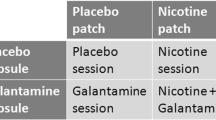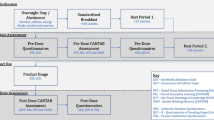Abstract
Rationale
The beneficial effects of nicotinic acetylcholine receptor (nAChR) agonists on cognitive performance have been widely shown. Paradoxically, recent preclinical studies employing extremely low doses of nAChR antagonists have also found cognitive enhancement, perhaps pointing to a novel treatment mechanism for cognitive deficits.
Objectives
The aim was to test whether low doses of the nAChR antagonist mecamylamine would benefit performance in human volunteers.
Methods
The study employed a double-blind within-subject design. Over four separate days, healthy adult non-smokers (n = 23) were tested with placebo and three trace doses of mecamylamine (0.25–1 mg, p.o.), adjusted for body weight. Participants performed three computerized tasks: a task of spatial selective attention and stimulus detection, the rapid visual information processing task (RVIPT) taxing sustained attention and working memory, and a change detection short-term memory task. Subjective state and vital signs were assessed repeatedly.
Results
Mecamylamine did not improve performance in any of the tasks. Any trends that were observed instead pointed toward performance impairment. Mecamylamine also had no effects on subjective state or vital signs.
Conclusions
The present results do not support the hypothesized cognitive-enhancing potential of low doses of mecamylamine. Contrary to preclinical reports, these findings speak against low-dose nAChR antagonism as a novel avenue for treating cognitive deficits.



Similar content being viewed by others
References
Adams CE, Stevens KE (2007) Evidence for a role of nicotinic acetylcholine receptors in schizophrenia. Front Biosci 12:4755–4772
Buccafusco JJ, Beach JW, Terry AV (2009) Desensitization of nicotinic acetylcholine receptors as a strategy for drug development. J Pharmacol Exp Ther 328:364–370
Cousineau D (2007) Confidence intervals in within-subject designs: a simpler solution to Loftus and Masson’s method. Tutor Quant Methods Psychol 1:42–45
Foulds J, Stapleton J, Swettenham J, Bell N, McSorley K, Russell MAH (1996) Cognitive performance effects of subcutaneous nicotine in smokers and never-smokers. Psychopharmacology 127:31–38
Gitelman DR, Prohovnik I (1992) Muscarinic and nicotinic contributions to cognitive function and cortical blood flow. Neurobiol Aging 13:313–318
Grier JB (1971) Nonparametric indexes for sensitivity and bias—computing formulas. Psychol Bull 75:424–429
Grottick AJ, Higgins GA (2000) Effect of subtype selective nicotinic compounds on attention as assessed by the five-choice serial reaction time task. Behav Brain Res 117:197–208
Hahn B, Ross TJ, Stein EA (2006) Neuroanatomical dissociation between bottom-up and top-down processes of visuospatial selective attention. NeuroImage 32:842–853
Hahn B, Ross TJ, Yang Y, Kim I, Huestis MA, Stein EA (2007) Nicotine enhances visuospatial attention by deactivating areas of the resting brain default network. J Neurosci 27:3477–3489
Hahn B, Shoaib M, Stolerman IP (2011) Selective nicotinic receptor antagonists: effects on attention and nicotine-induced attentional enhancement. Psychopharmacology 217:75–82
Hahn B, Harvey AN, Concheiro-Guisan M, Huestis MA, Holcomb HH, Gold JM (2013) A test of the cognitive self-medication hypothesis of tobacco smoking in schizophrenia. Biol Psychiatry 74:436–443
Hahn B, Harvey AN, Fischer B, Keller W, Ross TJ, Stein EA (2014) Nicotinic modulation of the default network of resting brain function in non-smokers. American College of Neuropsychopharmacology 53rd Annual Meeting, Poster Number M216
Haydar SN, Dunlop J (2010) Neuronal nicotinic acetylcholine receptors—targets for the development of drugs to treat cognitive impairment associated with schizophrenia and Alzheimer’s disease. Curr Top Med Chem 10:144–152
Heishman SJ, Kleykamp BA, Singleton EG (2010) Meta-analysis of the acute effects of nicotine and smoking on human performance. Psychopharmacology 210:453–469
Hurst R, Rollema H, Bertrand D (2013) Nicotinic acetylcholine receptors: from basic science to therapeutics. Pharmacol Ther 137:22–54
Kendziorra K, Wolf H, Meyer PM, Barthel H, Hesse S, Becker GA, Luthardt J, Schildan A, Patt M, Sorger D, Seese A, Gertz H-J, Sabri O (2011) Decreased cerebral a4ß2* nicotinic acetylcholine receptor availability in patients with mild cognitive impairment and Alzheimer’s disease assessed with positron emission tomography. Eur J Nucl Med Mol Imaging 38:515–525
Levin ED, Caldwell DP (2006) Low-dose mecamylamine improves learning of rats in the radial-arm maze repeated acquisition procedure. Neurobiol Learn Mem 86:117–122
Levin ED, Rezvani AH (2002) Nicotinic treatment for cognitive dysfunction. Curr Drug Targets CNS Neurol Disord 1:423–431
Levin ED, Castonguay M, Ellison GD (1987) Effects of the nicotinic receptor blocker mecamylamine on radial-arm maze performance in rats. Behav Neural Biol 48:206–212
Levin ED, Cauley M, Rezvani AH (2013) Improvement of attentional function with antagonism of nicotinic receptors in female rats. Eur J Pharmacol 702:269–274
Little JT, Johnson DN, Minichiello M, Weingartner H, Sunderland T (1998) Combined nicotinic and muscarinic blockade in elderly normal volunteers: cognitive, behavioral, and physiologic responses. Neuropsychopharmacology 19:60–69
Loeb M, Alluisi EA (1984) Theories of vigilance. In: Warm JS (ed) Sustained attention in human performance. Wiley, London, pp. 179–205
Martin LF, Kem WR, Freedman R (2004) Alpha-7 nicotinic receptor agonists: potential new candidates for the treatment of schizophrenia. Psychopharmacology 174:54–64
McNair DM, Lorr M, Droppleman LF (1971) Profile of mood states manual. Educational and Industrial Testing Service, San Diego, CA
Meyer EM, Tay ET, Papke RL, Meyers C, Huang GL, deFiebre CM (1997) 3-[2,4-Dimethoxybenzylidene]anabaseine (DMXB) selectively activates rat alpha 7 receptors and improves memory-related behaviors in a mecamylamine-sensitive manner. Brain Res 768:49–56
Morey RD (2008) Confidence intervals from normalized data: a correction of Cousineau (2005). Tutor Quant Methods Psychol 4:61–64
Nagahara AH, Handa RJ (1999) Fetal alcohol-exposed fats exhibit differential response to cholinergic drugs on a delay-dependent memory task. Neurobiol Learn Mem 72:230–243
Newhouse PA, Potter A, Corwin J, Lenox R (1992) Acute nicotinic blockade produces cognitive impairment in normal humans. Psychopharmacology 108:480–484
Newhouse PA, Potter A, Singh A (2004) Effects of nicotinic stimulation on cognitive performance. Curr Opin Pharmacol 4:36–46
Perry E, Martin-Ruiz C, Lee M, Griffiths M, Johnson M, Piggott M et al (2000) Nicotinic receptor subtypes in human brain ageing, Alzheimer and Lewy body diseases. Eur J Pharmacol 393:215–222
Petrovsky N, Quednow BB, Ettinger U, Schmechtig A, Mossner R, Collier DA, Kuhn KU, Maier W, Wagner M, Kumari V (2010) Sensorimotor gating is associated with CHRNA3 polymorphisms in schizophrenia and healthy volunteers. Neuropsychopharmacology 35:1429–1439
Picciotto MR, Addy NA, Mineur YS, Brunzell DH (2008) It is not “either/or”: activation and desensitization of nicotinic acetylcholine receptors both contribute to behaviors related to nicotine addiction and mood. Prog Neurobiol 84:329–342
Pickworth WB, Fant RV, Butschky MF, Henningfield JE (1997) Effects of mecamylamine on spontaneous EEG and performance in smokers and non-smokers. Pharmacol Biochem Behav 56:181–187
Pimlott SL, Piggott M, Owens J, Greally E, Court JA, Jaros E et al (2004) Nicotinic acetylcholine receptor distribution in Alzheimer’s disease, dementia with Lewy bodies, Parkinson’s disease, and vascular dementia: in vitro binding study using 5-[(125)I]-A-85380. Neuropsychopharmacology 29:108–116
Potter AS, Ryan KK, Newhouse PA (2009) Effects of acute ultra-low dose mecamylamine on cognition in adult attention-deficit/hyperactivity disorder (ADHD). Hum Psychopharmacol 24:309–317
Quick MW, Lester RAJ (2002) Desensitization of neuronal nicotinic receptors. J Neurobiol 53:457–478
Radek RJ, Kohlhaas KL, Rueter LE, Mohler EG (2010) Treating the cognitive deficits of schizophrenia with alpha4beta2 neuronal nicotinic receptor agonists. Curr Pharm Des 16:309–322
Singh A, Potter A, Newhouse P (2004) Nicotinic acetylcholine receptor system and neuropsychiatric disorders. IDrugs. 7:1096–1103
Singh A, Das DK, Kelley ME (2006) Mecamylamine (Targacept). IDrugs 9:205–217
Stolerman IP, Goldfarb T, Fink R, Jarvik ME (1973) Influencing cigarette smoking with nicotine antagonists. Psychopharmacologia 28:247–259
Stolerman IP, Mirza NR, Shoaib M (1995) Nicotine psychopharmacology: addiction, cognition and neuroadaptation. Med Res Rev 15:47–72
Terry AV, Buccafusco JJ, Prendergast MA (1999) Dose-specific improvements in memory-related task performance by rats and aged monkeys administered the nicotinic-cholinergic antagonist mecamylamine. Drug Dev Res 47:127–136
Wallace TL, Ballard TM, Pouzet B, Riedel WJ, Wettstein JG (2011) Drug targets for cognitive enhancement in neuropsychiatric disorders. Pharmacol Biochem Behav 99:130–145
Warburton DM, Mancuso G (1998) Evaluation of the information processing and mood effects of a transdermal nicotine patch. Psychopharmacology 135:305–310
Wesnes K, Warburton DM (1984) Effects of scopolamine and nicotine on human rapid information-processing performance. Psychopharmacology 82:147–150
Wing VC, Wass CE, Soh DW, George TP (2012) A review of neurobiological vulnerability factors and treatment implications for comorbid tobacco dependence in schizophrenia. Addiction Reviews 1248:89–106
Young JM, Shytle RD, Sanberg PR, George TP (2001) Mecamylamine: new therapeutic uses and toxicity/risk profile. Clin Ther 23:532–565
Acknowledgments
We would like to thank Franklin Blatt (Pharm. D.) for generating the study capsules and preparing blinded treatments for study days. We would like to thank Dr. Ian Stolerman for insightful comments on this manuscript and Drs. Mariel Herbert and Joshua Chiapelli for their help with screening participants. This work was supported by a grant from the National Institute on Drug Abuse (grant number R01 DA035813 to B.H.).
Author information
Authors and Affiliations
Corresponding author
Ethics declarations
Participants were recruited from the local community through internet advertising, flyers, and referrals and gave written informed consent for a protocol approved by the University of Maryland Baltimore Institutional Review Board.
Electronic supplementary material
ESM 1
(DOCX 17 kb)
Rights and permissions
About this article
Cite this article
Yuille, M.B., Olmstead, C.K., Wells, A.K. et al. A test of the cognitive-enhancing potential of low-dose mecamylamine in healthy non-smokers. Psychopharmacology 234, 109–116 (2017). https://doi.org/10.1007/s00213-016-4443-2
Received:
Accepted:
Published:
Issue Date:
DOI: https://doi.org/10.1007/s00213-016-4443-2




